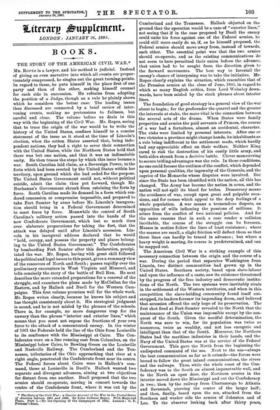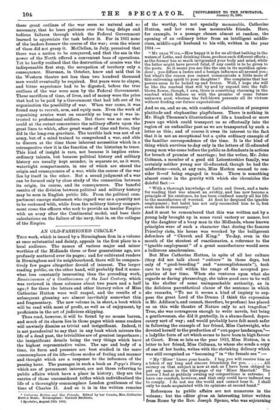BOOKS•
THE STORY OF THE AMERICAN CIVIL WAR.*
Mx. ROPES is a lawyer, and his method is judicial. Instead of giving an even narrative into which all events are propor- tionately compressed, he singles out the great turning-points. In regard to these, he puts himself in the place first of one party and then of the other, making himself counsel for each side in succession. He refrains from adopting the position of a Judge, though as a rule he plainly shows which he considers the better case. The leading issues thus discussed are connected by a brief review of inter- vening events, making no pretensions to fullness, but careful and clear. The volume before us deals in this way with the beginning of the Civil War. Mr. Ropes, seeing that to trace the origin of the war would be to write the history of the United States, confines himself to a concise statement of the issue as it stood at the time of Lincoln's election, when the cotton States asserted that, being inde- pendent nations, they had a right to sever their connection with the United States, while the Northern States held that there was but one nation, and that it was an indissoluble unity. He then traces the steps by which this issue became a war. South Carolina laid claim, as a Sovereign Power, to the forts which had been erected by the United States within her territory, upon ground which she had ceded for the purpose. The United States Government could not, without political suicide, admit the claim thus put forward, though Mr. Buchanan's Government shrank from retaining the forts by force. South Carolina made its demand in a form which ren- dered concession or compromise impossible, and prepared to take Fort Sumter by arms before Mr. Lincoln's inaugura- tion should bring in a Federal Government determined to meet force by force. Meanwhile the control of South Carolina's military action passed into the hands of the new Confederate Government, which lost so much time over elaborate preparations for taking the fort, that the attack was delayed until after Lincoln's accession. Lin- coln in his inaugural address declared that he would "hold, occupy, and possess the property and places belong- ing to the United States Government." The Confederates by bombarding Fort Sumter after this declaration, precipi- tated the war. Mr. Ropes, having with great skill followed the political and legal issues to this point, gives a summary view of the resources of North and South ; passes rapidly over the preliminary encounters in West Virginia and Missouri, and tells concisely the story of the battle of Bull Run. He next describes the more extended preparations for a renewal of the struggle, and examines the plans made by McClellan for the Eastern, and by Halleck and Buell for the Western Cam- paigns. This first volume promises well for the whole work. Mr. Ropes writes clearly, because he knows his subject and has thought consistently about it. His strategical judgment is sound, and he is not misled by the phrases of the schools. There is, for example, no more dangerous trap for the unwary than the phrase "interior and exterior lines," which means that you must not expose the fractions of your own force to the attack of a concentrated enemy. In the winter of 1861 the Federals held the line of the Ohio from Louisville to its confluence with the Mississippi at Cairo. The Con- federates were on a line running east from Columbus, on the Mississippi below Cairo, to Bowling Green on the Louisville and Nashville Railway. The Cumberland and the Ten- nessee, tributaries of the Ohio approaching that river at a right angle, penetrated the Confederate front near its centre. The Federal forces about Cairo were in Halleck's com- mand, those at Louisville in Buell's. Halleck wanted two separate and divergent advances, aiming at two objectives far distant from one another. Buell proposed that the two armies should co-operate, moving in concert towards the centre of the Confederate front, where it was cut by the • The Story of the Civil War : a Concise Account of the War in the Mated States of America between 1861 and 1866. By John Codman Ropes. With Maps and Plans. Part L—To the Opening of the Campaigns of 1862. London t G. P. Pntnam's Sons.
Cumberland and the Tennessee. Halleck objected on the ground that the operation would be a case of " exterior lines," not seeing that if in the case proposed by Buell the enemy could unite his force against one of the Federal armies, he could still more easily do so, if, as he himself proposed, the Federal armies should move away from, instead of towards, each other. The essential point was that the two armies should co-operate, and as the existing communications do not seem to have permitted their union before the advance, that union had to be sought from the direction given to the forward movements. The best way to forestall the enemy's chance of interposing was to take the initiative. Mr- Ropes clearly explains the situation, which resembles that of the Prussian armies at the close of June, 1866, in regard to which so many English critics, from Lord Wolseley down- wards, have been misled by the stock phrases about interior lines.
The foundation of good strategy is a general view of the war about to begin ; for the profounder the quarrel and the greater the interests at stake, the more vital is the connection between the several acts of the drama. When States were family properties and armies the paid servants of Princes, the course of a war had a fortuitous, almost an accidental, character. The risks were limited by personal interests. After one or two victories a province might change hands, its inhabitants as a rule being indifferent to the settlement made, which hardly had any appreciable effect on their welfare. Neither King cared to risk the destruction of his costly little army, and both sides shrank from a decisive battle. Clever mametwring to secure trifling advantages was the rule. In these conditions, no one could foresee the outlines of the conflict, which depended upon personal qualities, the ingenuity of the Generals, and the caprice of the Monarchs whose disputes were involved. But since the State has been identified with the nation, all this has changed. The Army has become the nation in arms, and the nation will not spill its blood for trifles. Democracy means the avoidance of war, except upon great and palpable occa- sions, and for causes which appeal to the deep feelings of a whole population. A war means a tremendous dispute, an opposition of wills inflaming the passions of millions. It arises from the conflict of two national policies. And for the same reasons that in such a case render a collision inevitable, the course of the struggle can be foreseen. Masses in motion follow the lines of least resistance ; where the masses are small, a slight friction will deflect them so that these lines can hardly be traced in advance ; but where a heavy weight is moving, its course is predetermined, and can be mapped out.
The American Civil War is a striking example of this necessary connection between the origin and the course of a war. During the period that separates Washington from Lincoln, two distinct communities had grown up in the United States. Southern society, based upon slave-labour and upon the influence of a caste, saw its existence threatened by the progress of the free industry and democratic institu- tions of the North. The two systems were inevitably rivals in the settlement of the Western territories, and when in this competition the slave-holding community found itself out- stripped, its leaders foresaw its impending doom, and believed that secession offered the only hope of its preservation. The first shot fired at Fort Sumter revealed to the North that the maintenance of the Union was impossible except by the con- quest of the South. Given the needful determination, the North was sure to win, for its population was twice as numerous, twice as wealthy, and not less energetic and intelligent than that of the South. Moreover, the Northern States had the maritime industries in their hands, and the Navy of the United States was at the service of the Federal Government. This gave the North from the beginning the undisputed command of thd sea. Next to the sea—always the best communication as far as it extends—the forces were bound to follow the great inland communications, the rivers and the railways. Thus, while the whole coast of the Con- federacy was to the South an almost impenetrable wall, and to the North an open door, the Northern armies in the interior moved down the Mississippi and cut the Confederacy in two ; then by the railway from Chattanooga to Atlanta and Savannah, piercing the centre of the larger half ; and then, finally, based upon the sea, attacked from the
Southern and weaker side the armies of Johnston and of Lee. To the observer looking back after thirty years,
these great outlines of the war seem so natural and so necessary, that he loses patience over the long delays and tedious failures through which the Federal Government learned to appreciate the task before it. For in 1861 none of the leaders foresaw the course of the war ; even the wisest of them did not grasp it. McClellan, in July, perceived that there was a nation to be conquered, and that the sea in the power of the North offered a convenient base of operations. Yet he hardly realised that the destruction of armies was the indispensable first step, the occupation of territory only a consequence. Sherman, in October, knew and said that in the Western theatre not less than two hundred thousand men would eventually be required. But years were to elapse, and bitter experience had to be digested, before the true outlines of the war were seen by the Federal Government. These sacrifices of time, of lives, and of money were the price that had to be paid by a Government that had left out of its organisation the possibility of war. When war came, it was found easy to recruit, arm, and equip men. Even the work of organising armies went on smoothly so long as it was in- trusted to professional soldiers. But there was no one who could at the outset concentrate the military efforts upon the great lines to which, after great waste of time and force, they did in the long-run gravitate. The terrible lack was not of an army, bat of a mind trained to comprehend a war, and able to discern at the time those inherent necessities which in a retrospective view it is the function of the historian to trace. This kind of insight is rare, not because it implies extra- ordinary talents, but because political history and military history are usually kept asunder, in separate or, as it were, watertight compartments, in one of which are stored the origin and consequences of a war, while the course of the war lies by itself in the other. But a sound judgment of a war can be formed only by close study of the connection between its origin, its course, and its consequences. The baneful results of the division between political and military history may be seen in English public life. From the political com- partment emerge statesmen who regard war as a quantity not to be reckoned 'with, while from the military history compart- ment come the officers who seek to provide an insular Empire with an army after the Continental model, and base their calculations on the failure of the navy, that is, on the collapse of the Empire.



















































 Previous page
Previous page